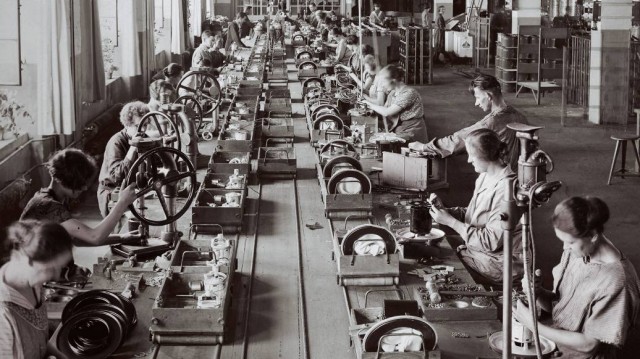It could be argued that the roots of our modern understanding of corporate culture lie in a study initiated to assess the impact of shop-floor lighting on worker productivity. The studies were conducted by the Harvard Business School between 1924 and the early 1930s at the Hawthorne plant of the Western Electric Company in Chicago.
The Hawthorne studies famously concluded that worker performance is largely dependent on social issues and job satisfaction, and much less on monetary incentives and physical working conditions (such as lighting).

If that was the case for a shop-floor industrial working environment in the late 1920s, it clearly is even more relevant in driving operational efficiency in today’s service-led working environment.
You may argue that the operational efficiency of an organization is all about execution of a plan laid down by the leaders of an organization – and thus there is no room for corporate culture to influence working practices. Is efficiency not purely a matter of rigorously and continuously implementing and optimising management-led processes and procedures? Well yes, but that’s where the Hawthorne studies are so revealing – and remain relevant to this day. They illustrate that an engaged and fully resourced workforce is vital to achieve and enhance operational efficiency.
The underlying reason for this “Hawthorne” effect is, I’d suggest, relatively simple – it’s all about facilitating and enhancing the quality of decision-making across an organization.
Delegation of Decision Making
The efficiency of any enterprise, and indeed the wider economy, is based on sound delegated decision making and the allocation of resources. This gives those with responsibility for specific tasks the means and authority to efficiently deliver on those tasks.
We all make constant decisions about how we use our time and resources in any given day. Even in a modest size enterprise the aggregate impact of such individual decisions has a significant impact on the efficiency of the enterprise. The question then is how best should organizations guide and direct their staff, while still allowing for the required delegated authority and personal responsibility for an efficient operating enterprise.
This is where we at Aletheian Advisors believe there is a key role for corporate culture – to provide a powerful means of guiding and stimulating individual behaviour without necessary imposing “one-size-fits-all” processes.
This does not mean that strong and dominant centralised leadership cannot be made to work in a corporate environment. However, to work well this requires considerable interaction and two-way communication between the leadership and the relevant employees – significantly more communication than most management teams appreciate. It is essential not only that employees receive ongoing instruction and guidance from the senior management, but that they can also provide senior management with regular updates and feedback.
As we all know through the inevitable frustrations and hard knocks of life in any organization, such communication is difficult to maintain in an open and constructive manner. However, as is noted in one of the examples below, regular and apparently transparent communication as part of a relatively flat organization structure is not in itself a panacea for engaging productively with one’s workforce.
Ultimately, whether one has a relatively hierarchical corporate structure or the sort of flat structure associated with a startup enterprise culture (see https://aletheian.co.uk/quiz-what-sort-of-organisation-is-yours/), we’ll face ongoing challenges specific to our organization and the collective character of the people working within the organization.
How to build a Corporate Culture that enables and encourages efficiency
Crucially, every organization has its own distinctive corporate culture, but if nobody is aware or monitoring the culture then in reality it’s not being proactively managed to enhance performance.
One may ask how one can start to build and apply such a corporate culture, in a manner which enhances operational efficiency. There clearly is no single route to this end destination but at Aletheian Advisors we make use of the following four Ws (or “Wx4”) in seeking to apply/adapt a given corporate culture to specific operational processes:
- What do we do?
- Why do we do it?
- Who do we serve?
- Where is our value creation?
This is a starting point, and the Aletheian corporate mapping process takes considerable more than the above into account when assessing the basis for a healthy corporate culture. That said, the above Wx4 framework provides great questions for any organization (and its separate teams) to regularly ask itself in establishing and continually improving a platform for operational excellence.
NASA
Perhaps the greatest defining example of an enterprise driven to extraordinary levels of operational efficiency by the collective effort of thousands of employees responding to, “What do we do?”, was that of NASA in the mid to late 1960s. Every employee working at NASA during that period knew the organization was working towards one single goal – to put a man on the moon. A great example of how a group of employees at NASA responded to this question, and to “Where is my value creation?” resulting in operational excellence is detailed in the podcast ‘13 minutes to the moon’.
In this highly recommended podcast Gerry Griffin (one of the many flight controllers) described how the team made decisions; “We didn’t make decisions at the highest level possible – we shoved them down to the lowest level”. This sense of delegated authority was a critical part of the corporate culture at NASA, and clearly given the mammoth task facing the organization within very tight timelines, it was an essential requirement to solve the substantial problems that needed to be overcome to achieve the end goal.
An example of how this delegated corporate culture allowed critical tasks to be achieved very quickly comes from Steve Bales. He details how, just two weeks before the Apollo 11 launch date, a computer programme alarm that had never been heard before went off during a lunar landing simulation. Consequently Gene Kranz (a flight director) delegated the task of researching all potential computer alarm signals to Steve Bales. In turn Bales delegated the research to his technical computer software specialist Jack Garman, who was 23 years old at the time.

Garman consulted with some of the top computer software specialists in the country, then conducted his research and signed off his list a week before launch date. The set of decisions taken by Kranz and Bales, and the specific work that came about from such decisions through the work of the young and relatively junior Garman, were to prove critical to the success of the Apollo 11 mission.
During the actual Lunar landing the Apollo 11 crew reported a 1202 computer programme alarm. None of the flight directors knew what it was and people were scrambling for an answer as the astronauts hurtled towards the lunar surface. Bales using Garmin’s list was able to confidently report that the alarm was not mission critical. The astronauts proceeded with the lunar landing. The Apollo 11 moon landing might never have happened but for the efforts of a 23 year old junior engineer – and the trust that was placed in him by much more senior Flight Engineers.
But my company is not NASA
Such extraordinary teamwork and an engaged culture as the basis for delivering operational excellence was not a nice-to-have option for NASA, given how high the stakes were in the Apollo 11 mission. However, a culture with high levels of delegated authority is not the only path to operational efficiency. Corporate life is clearly not that simple. Delegation can bring its own challenges.
Two recent examples of this can be seen in the banking and technology sectors. The global financial crisis of 2007/8 illustrated that delegated trading limits and authority in many global banks were implemented without sufficient oversight. Management teams therefore lost effective control of risk taking within their institutions.
Quite simply, traders were taking too many risks and were mainly motivated by their bonuses rather than by the good of the institution. The misalignment of interests between such key employee risk takers, senior management, shareholders and the clients of the bank is a clear indicator of a corporate culture in crisis. (See https://aletheian.co.uk/10-subtle-signs-that-your-organisations-culture-may-be-holding-you-back/).
This situation could simply have been identified and addressed before they reached crisis point had management teams regularly asked/assessed two of our four Wx4 questions – “What do we do?” and “Why do we do it?”
In the case of the technology sector, we see a strong connection between NASA’s great mission of the 1960s to land a man on the moon and the missions of tech startups that must succeed or die. Just like NASA, many of these enterprises are built on the extraordinary dedication of their employees. The very strong corporate cultures of companies such as Microsoft and Apple have become legendry.
More recently, Google’s corporate culture has become a source of fascination, with the motto “Don’t be evil” in its code of conduct and regular open-ended Q&A sessions with staff where dissent and detailed questions on any subjects were welcomed.
However, such commendably transparent levels of communication have not survived, as executives and employees have fallen out over the firm’s high-profile government and military contracts. Clearly, the answer to the Wx4 question of “Who do we serve?” has become very muddied over time. This needs clarification if the company is to re-unite all stakeholders behind a clear purpose.
Summary
Looking back over nearly 100 years of corporate history since the conclusion of the Hawthorne studies, it’s clear that every generation needs to relearn and re-establish the accepted best-in-class working practices. Priorities will inevitably change as processes are reinvented, but the lessons from the successes and failures of the last 100 years illustrate that actively managing corporate culture is a vital in creating the environment for healthy and productive decision making and operational efficiency. Using the Aletheian Wx4 process (What/Why/Who/Where) is a great way to initiate and then monitor a corporate culture framework.
Andrew La Trobe is a Senior Advisor at Aletheian Advisors



